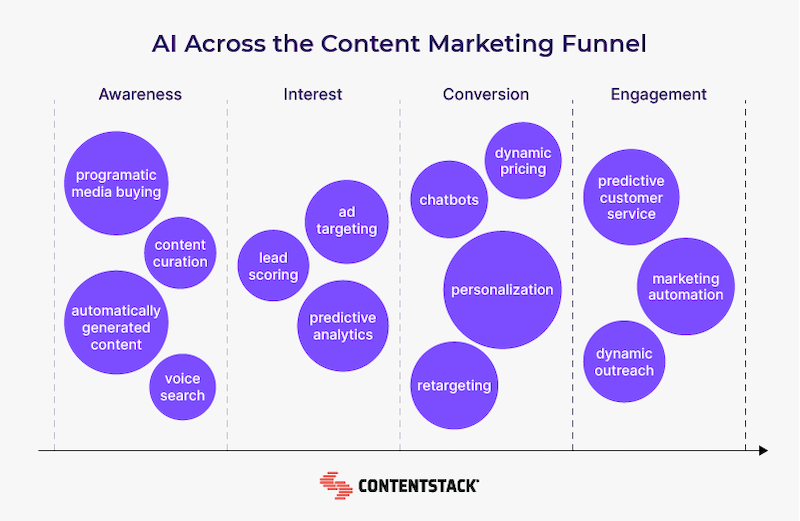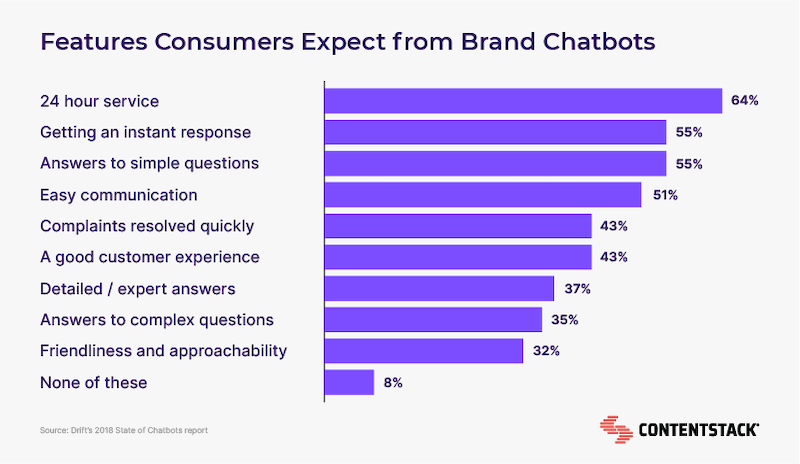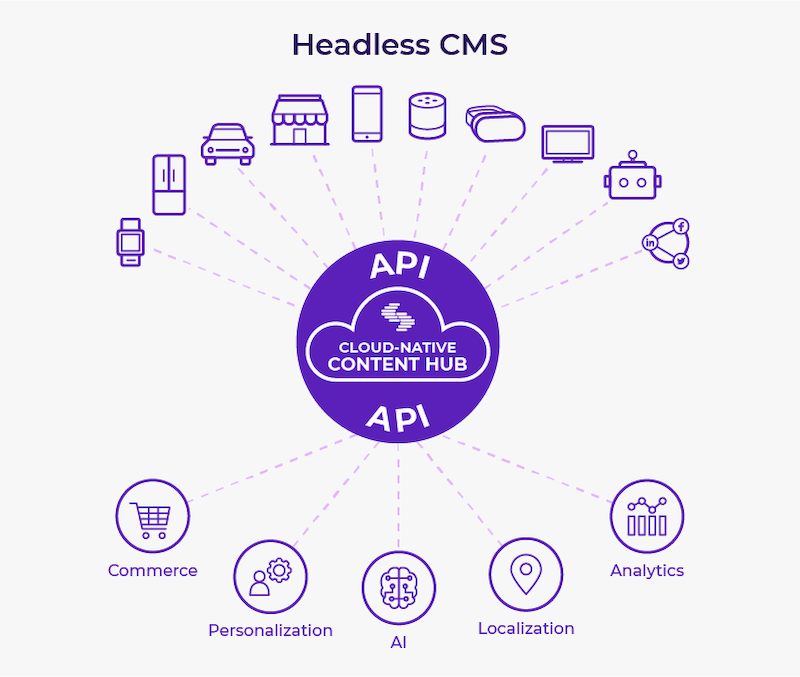Artificial intelligence is changing the world, one everyday task at a time. Ever used a navigation app to find your way to a destination? Then you very likely benefited from artificial intelligence that crunched a bunch of data at a super-fast speed to show you the best and fastest route. And we know you’ve used email. You can thank AI for modern email features like automatic spam filters and categorizations that make email more manageable.
Considering how AI can be applied to such a variety of verticals, it only makes sense that there are plenty of applications for it in the content management space. Read on to find out how AI is already powering content teams, where it could go in the future, and how you can integrate content management and artificial intelligence to future-proof your content operations.
What is Artificial Intelligence?
Artificial intelligence (AI for short) is a term that describes a machine performing human activities.
There are several capabilities that fall under the umbrella of AI:
- Machine learning is when a machine automatically learns something new without being programmed to do so
- Natural language processing is when a machine reads human language
- Natural language generation is when a machine writes or even speaks in a human language
AI was created to complete these and other tasks faster (and sometimes better) than humans. When it comes to content ops, the combination of content management and artificial intelligence is a great tool for giving workers back the time they need to perform more complex tasks that still require a human brain.
4 Ways Content Management & Artificial Intelligence Are Already Impacting Content Ops
AI shines when it comes to understanding vast pools of data and automating routine tasks. This has a lot of benefits: improving consumer experiences, helping businesses save time and money, and even exposing patterns that can uncover new opportunities and inform smart business decisions.
In this section, we’ll explore how AI is helping businesses take advantage of these benefits by up-leveling content management across various stages of the content operations workflow.
1. Smart Content Analysis and Categorization
One amazing thing that artificial intelligence can do is analyze a piece of content to identify its sentiment and overall tone. This is important for helping content managers quickly determine whether a piece of content is right for their audience or if it needs some tweaking before it’s able to really engage the intended consumer. IBM Watson, for example, uses AI to automate content categorization, text labeling, sentiment analysis, keyword extraction, and more.
2. Automatic Image Tagging
Images enhance your content and can increase consumer engagement. Unfortunately, there’s almost nothing less engaging for workers than manually tagging image after image for search and SEO purposes. But it’s still a supremely important task. And that is what makes it a great job for AI.
Pretty recently, AI-powered automated image recognition has gotten smart enough to tag images in a matter of seconds—letting your content workers get back to deeper work.
3. Scalable Personalization and Predictions
AI also brings scalability to another important but nearly impossible task for human workers: tracking and making use of individual user behavior. AI can automate the process of watching what each user on your website or app is doing simultaneously. Then, it can compile this data to look for patterns that will help it predict, based on past behavior, what each user might want next.
This information can uplevel any marketing department’s personalization efforts, from serving dynamic content to making product recommendations and more. And improving personalization has never been more important. In the words of the management consulting firm McKinsey, “Personalization will be the prime driver of marketing success within five years.” In fact, they found that leaders in personalization were already able to increase revenue by 5 to 15% and improve efficiency on marketing spend by 10 to 30%.
4. Time-Saving Content Creation Assistance
And now for the big one: AI can be a big help when it comes to actually creating content. While the advance of AI into content creation may feel scary for some marketing professionals, an article created by Articoolo’s artificial intelligence system, “A robot explains how to achieve the perfect work-life balance,” shows that there is a long way to go before “robots” will be able to match the tone or accuracy of human writers.
Artificial intelligence still isn’t great at coming up with original content ideas or creating nuanced pieces of content. However, a really well-trained AI tool should be able to contribute to straightforward writing projects such as news articles, factual reports, translations, transcriptions, and editing for accuracy.
For now, in the content creation space, AI is basically a tool for improving the ROI on content marketing, which can often be resource-intensive. AI can do the legwork when it comes to research and data while human writers can take this info and do the deep work required to create high-value, relevant content for each target customer.

Imagining the Future of AI in Content Management
Now that we’ve explored the main areas in which content management and artificial intelligence are already coming together to improve content operations, let’s talk about a few ways AI may improve marketing even more in the future.
Interactions Between AI Tools
If you’ve ever used your voice-activated smart speaker (like a Google Home) to control something in your house (like turn on a smart light from Philips Hue) then you’ve experienced an interaction between two different AI-powered devices. And we think similar interactions are in store for the future of AI-powered tools in the content operations space.
It’s only a matter of time before AI-enabled content management systems (CMSs) and other content platforms and tools will be able to interact with each other in smart, automatic ways to provide faster functionality and better experiences for consumers and marketers alike.
On-the-Spot SEO Improvements
Taking the idea of sentiment analysis one step further, we predict that in the near future AI-enabled CMSs may be able to identify opportunities for SEO improvements in real time. This capability would empower marketing professionals to create more effective content in less time, which will outperform competitors and rank well in search engines.
Content Gap Identification
When you’re in the thick of it all, it can be hard to see where your content may be lacking (or where your competitors’ content may be lacking). But both of these situations give you the opportunity to fill those “gaps” and capture more traffic. One day, we hope AI will become smart enough to flag gaps and make recommendations so you can create fresh content that adds value and generates new leads.
Customer Service Automations
Customer service is another one of those expensive yet necessary parts of business. Fortunately, it can become a little less time- and money-intensive with the help of AI. Just like AI enables content folks to focus on deep work, AI-powered chatbots can enable customer service folks to do the same.
While many of today’s chatbots can address very simple questions with answers pulled from a knowledge base, we look forward to the day when a large percentage of queries don’t have to be routed back to human agents. After all, it’s the instantaneous and around-the-clock support that consumers are truly looking for when interacting with brand chatbots.

Get Started with Content Management and Artificial Intelligence with Contentstack
The future of content ops is bright, thanks to content management and artificial intelligence. Your business can become a part of that bright future by adopting a composable CMS that’s built to integrate with AI-enabled content management tools.
And we only know one CMS of the sort: Contentstack.
Contentstack is an agile CMS that’s part of the MACH revolution. That means it’s microservices-based, API-connected, cloud-native, and is built on headless architecture from the ground up. Because of Contentstack’s decoupled nature, almost any modern, AI-powered content management tool can be integrated to help your team with everything from automated content analysis to smart content creation.

Our turnkey integrations (which we call Experience Extensions) with best-in-class tools like
IBM Watson, Salesforce Einstein, and MonkeyLearn are already empowering Contentstack users to leverage AI and reap a variety of benefits.
To get started, sign up for a free trial or a personalized demo today and see why the future of your content operation lies in your ability to integrate content management and artificial intelligence with the help of Contentstack.
